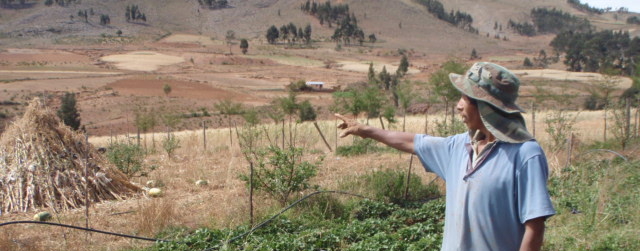
Conservation Agriculture
Lead Organization:
The Foundation for the Promotion and Investigation of Andean Products PROINPA
Partner Organizations:
Centro de investigacion de Forrajes, CIFEMA, Penn State University
Community of Practice:
Countries:
Bolivia
Duration:
12/2013—12/2014
Overview:
The Sustainable Agriculture and Natural Resource Management Collaborative Research Support Program, SANREM CRSP, a USAID-sponsored program that leverages technical support from U.S. universities, supports long-term research in multiple sites in the global south around a common theme. The current phase (Phase IV) runs from 2009-2014 and is centered on the theme Conservation Agriculture Production Systems (CAPS). The CAPS program is taking place in 15 regions including the Andes (Ecuador and Bolivia), West Africa, Southern Africa, and Uganda and Kenya. PROINPA has been one of the grantees on the CAPS program and is working with researchers from Virginia Tech (Economics) and Penn State University (Soil Science) in a soil conservation project in Tiraque, Cochabamba, Bolivia. The project includes the use of reduced tillage, legume cover crops and validation of the early maturing and mildew-tolerant quinoa varieties in the crop rotation systems. On May 1, 2013 the Bolivian government announced the expulsion of USAID from Bolivia because they think they are interfering with national sovereignty and trying to foment anti-government sentiment, which made impossible for SANREM to fund the 4th year of the project. PROINPA has put together a proposal that seeks to conclude the research initiated under SANREM. Through this proposal Penn State University (PSU) and Virginia Tech (VT) will continue strengthening PROINPA’s capacity to carry out applied research on soils (including laboratory-based soil analysis) and economics, in conjunction with farmers. PSU and VT will contribute through in-kind support. This CCRP grant will look at addressing the barriers to adoption of promising cover crops while supporting and strengthening seed systems for these crops. It will also respond to producers request for help in introducing appropriate quinoa varieties into their rotations, and producing quinoa seed for the highlands. Important results and advances from the first three years of the project include: training of two PROINPA agronomists in multiple soil analysis methods including measuring available nitrogen, phosphorus, carbon and cations, in soil samples as well as, soil PH, water holding capacity and use of the Chromate Microplate reader and associated equipment. Preliminary results show that more biomass is produced when oats are grown in association with vetch, however the real benefit of using vetch as both a cover crop and/or incorporated as a green manure throughout the rotation from potato to oats to forage will not be known until the end of the fourth year. During the past three years of participatory research farmers have expressed interest in plating quinoa because of its high demand and price. One of the challenges of planting quinoa is seeding it on hillsides, since most available seeders were developed for the high plains. The project has already developed and is testing a handheld seeder. The proposal will build on these research areas.
Grant Aims:
Cover crop combinations that were chosen by farmers through participatory research in the 2010-2012 will be validated in broader contexts. That is option by contexts will be developed.A local seed supply system will be developed for the vetch cover crop, which was shown to effectively increase soil fertility in the previous phase of the project.Reduced tillage technologies will be evaluated in a participatory manner by project farmers.Various quinoa varieties will be tested in the non-traditional quinoa growing area.A seed system for proven quinoa varieties will be developed.A labor saving, animal-drawn implement for the planting of quinoa and other grains, will be validated with project farmers and project partner CIFEMA.Soil laboratories at both the local and national level will be strengthenedPROINPA technicians and agronomists will be further trained in soil science techniques.